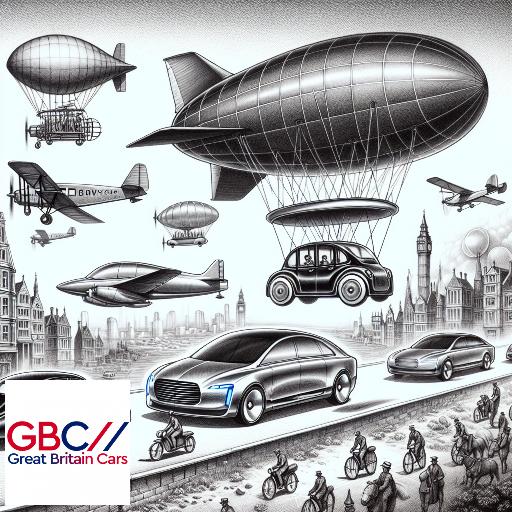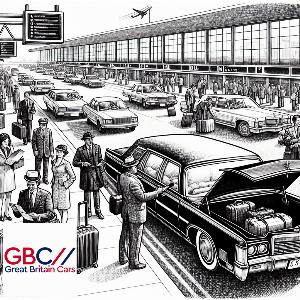The Evolution of Air Minicabs into Air Minicabs

History of Air transfers
Air transfers, a concept that was once a mere figment of imagination, have evolved significantly over the years. The history of air transfers dates back to the early 20th century when the first attempts at air travel were made. However, it was not until the late 1940s that the first air transfer service was launched in the United States. This marked the beginning of a new era in transportation. Over the years, air transfers have undergone numerous transformations, evolving into what we now refer to as air transfers. The advent of technology has played a crucial role in this evolution. Today, air transfers are equipped with advanced navigation systems, sophisticated interiors, and are capable of vertical take-off and landing, making them a viable option for urban transportation. The evolution of air transfers into air transfers has revolutionized the transportation industry, offering a faster, more efficient, and convenient mode of travel. As we move forward, the potential for further advancements in this field is limitless, promising a future where air transfers become a common sight in our skies.
Transition to Air transfers
The evolution of air transfers into air transfers marks a significant milestone in the aviation industry. This transition is not just a change in terminology, but a shift in the way we perceive and utilize air travel. Air transfers are set to revolutionize urban mobility, offering a faster, more efficient mode of transportation. Unlike traditional air transfers, which are often associated with luxury and exclusivity, air transfers aim to democratize air travel, making it accessible to a broader audience. They are designed to operate like traditional transfers, but in the sky, providing on-demand, point-to-point services. This transition to air transfers is driven by advancements in technology, including electric propulsion, autonomous flight systems, and vertical take-off and landing capabilities. As we move towards a future where congestion and long travel times become a thing of the past, the transition to air transfers is a promising step towards a more efficient, sustainable, and inclusive transportation system.
Technological Advancements
The evolution of air transfers into air transfers is a testament to the rapid technological advancements in the aviation industry. This transformation is driven by the development of electric vertical take-off and landing (eVTOL) aircraft, which are designed to operate in urban environments. These air transfers are not only eco-friendly but also efficient in bypassing traffic congestion, promising a revolution in urban mobility. The integration of artificial intelligence and machine learning has further enhanced the safety and efficiency of these air transfers. Advanced navigation systems, collision avoidance technology, and autonomous flight capabilities are some of the key features that make air transfers a viable transportation option. Moreover, the use of blockchain technology for ticketing and payment systems ensures a seamless user experience. The evolution from air transfers to air transfers is a significant leap towards a future where urban air mobility is not just a concept, but a reality. This technological revolution is set to redefine our commuting experiences, making them faster, safer, and more convenient.
Regulatory Changes
The evolution of air transfers into air transfers is a significant leap in the transportation industry. However, this transformation is not without its challenges, particularly in terms of regulatory changes. As air transfers transition into air transfers, they will be subject to more stringent regulations to ensure safety and efficiency. These regulations will cover aspects such as air traffic control, vehicle certification, pilot licensing, and operational rules. The Federal Aviation Administration (FAA) and other international aviation authorities are already working on creating a regulatory framework that will accommodate this new mode of transportation. These changes are crucial to ensure that air transfers operate safely and efficiently, without causing disruption to existing air traffic. The evolution of air transfers into air transfers is an exciting development, but it is essential that regulatory changes keep pace with technological advancements to ensure a smooth transition and the safety of all involved.
Economic Impact
The evolution of air transfers into air transfers is set to have a significant economic impact. This transformation is expected to revolutionize the transportation industry, creating new jobs and stimulating economic growth. The development and manufacturing of air transfers will require a skilled workforce, leading to job creation in sectors such as engineering, software development, and aviation. Furthermore, the operation of air transfers will necessitate the development of new infrastructure, such as vertical take-off and landing ports, which will also contribute to economic growth. The air transfer industry could also boost tourism, as it will provide a novel and efficient mode of transport for tourists. However, it's crucial to consider the potential economic challenges, such as the cost of developing and maintaining this new form of transport and the potential impact on traditional transfer services. Overall, the evolution of air transfers into air transfers promises to bring significant economic changes.
Environmental Considerations
As the concept of air transfers evolves into air transfers, environmental considerations are paramount. The potential for air transfers to revolutionize urban mobility is immense, but it must be balanced with the need to minimize environmental impact. The use of electric propulsion systems, for instance, could significantly reduce carbon emissions compared to traditional ground-based transfers. However, the energy required to charge these systems must also be sourced sustainably. Noise pollution is another concern. Air transfers must be designed to operate quietly to avoid disturbing urban environments. Furthermore, the infrastructure supporting air transfers, such as vertiports, must be built with minimal environmental disruption. This includes considering the impact on local wildlife and ecosystems during construction. As air transfers become a reality, it is crucial that these environmental considerations are not an afterthought, but an integral part of the design and implementation process. Only then can we truly harness the potential of this exciting new mode of transport.
Future of Air transfers
The future of transportation is set to take a dramatic turn with the evolution of air transfers into air transfers. This transformation is not just a change in terminology, but a significant leap in technology and convenience. Air transfers, unlike their predecessor, are expected to offer a more personalized, efficient, and comfortable mode of transport. The concept of air transfers is built on the foundation of autonomous flying vehicles, capable of transporting passengers from one location to another without the need for a pilot. This technology is expected to revolutionize the way we travel, reducing traffic congestion and travel time significantly. Moreover, air transfers are being designed with sustainability in mind. Many companies are investing in electric and hybrid models, aiming to reduce carbon emissions and contribute to a greener planet. In conclusion, the future of air transfers promises a seamless, efficient, and eco-friendly mode of transport. As we move towards this future, we can expect our skies to become the next frontier for urban mobility.
Air transfer Services
The evolution of air transfers into air transfers is a significant leap in the transportation industry. Air transfer services are revolutionizing the way we travel, offering a faster, more efficient mode of transport. These services are designed to provide a seamless, hassle-free travel experience, bypassing traffic congestion and reducing travel time significantly. Air transfers are not just a concept anymore; they are becoming a reality. Companies like Uber and Volocopter are already testing their air transfer prototypes, aiming to commercialize them in the near future. These air transfers are designed to be eco-friendly, running on electricity, and are expected to be autonomous, reducing the risk of human error. The introduction of air transfer services is a testament to the rapid advancements in technology and innovation. It is a step towards a future where commuting is no longer a time-consuming chore, but a quick, enjoyable experience. The evolution from air transfers to air transfers is indeed a game-changer, promising a new era of urban mobility.
Passenger Experience
The evolution of air transfers into air transfers is set to revolutionize the passenger experience. This transformation is not just about a change in name, but a complete overhaul of the entire air travel experience. Air transfers promise to offer a more personalized, convenient, and efficient mode of transportation. Unlike traditional air transfers, air transfers will be designed with a focus on passenger comfort and luxury. They will feature state-of-the-art technology, including advanced navigation systems, high-speed internet connectivity, and luxurious interiors. Passengers will be able to enjoy a seamless travel experience, with the ability to book rides on-demand and reach their destinations faster than ever before. The evolution of air transfers into air transfers is a testament to the rapid advancements in aviation technology and a glimpse into the future of urban mobility. This shift is expected to redefine the passenger experience, making air travel more accessible, enjoyable, and convenient for everyone.
Safety Measures
As the concept of air transfers evolves into air transfers, safety measures become paramount. The transition from ground to air transportation presents unique challenges that require innovative solutions. Firstly, air transfers must be equipped with advanced navigation systems to ensure precise landing and take-off. These systems should be capable of detecting and avoiding obstacles, both in the air and on the ground. Secondly, emergency protocols need to be established. In case of technical failures, air transfers should have built-in safety features like parachutes or auto-landing systems. Regular maintenance checks are also crucial to ensure the airworthiness of these vehicles. Thirdly, operators must be adequately trained to handle these new vehicles. This includes not only technical skills but also emergency response and customer service. Lastly, regulatory bodies need to establish clear guidelines for air transfer operations. This includes defining air corridors, setting altitude limits, and establishing no-fly zones. In conclusion, the evolution of air transfers into air transfers requires a comprehensive approach to safety, encompassing technology, training, and regulation.
Our Latest Blog Posts

Stansted to the Land of Angles: Discovering Norfolk
Blog about Stansted to the Land of Angles: Discovering Norfolk

Personalizing Your Airport Minicab: Special Requests and Services
Blog about Personalizing Your Airport Transfer: Special Requests and Services

Prepping for Business Trips: Airport Minicab Essentials
Blog about Prepping for Business Trips: Airport Transfer Essentials

Heathrow to Historic Canterbury: Pilgrimages and Medieval Tales
Blog about Heathrow to Historic Canterbury: Pilgrimages and Medieval Tales
Blogs Pages
Londons Theatre District: Arriving in Style

Blog about Londons Theatre District: Arriving in Style...
Navigating Londons Festive Season: Airport Minicabs from Heathrow

Blog about Navigating Londons Festive Season: Airport Transfers from Heathrow...
Road Travel from London: Long-Distance Minicab Journeys

Blog about Road Travel from London: Long-Distance transfer Journeys...
Gatwick to Scottish Highlands Road Trip | Great Britain Cars

Journey from Gatwick to the Scottish Highlands, exploring stunning landscapes and historic sites along the way | Great Britain Cars...
Our Clients Testimonials

Reliable
The driver was very reliable, helpful and kind .His behaviour was just adorable.
Michael





Reached on time
Due to this amazing cab service. We got our destination on the time.
Linda





Great pick ups
They jolt of energy on the specific time. They give totally best.
Donald





Reliable
The driver was so reliable and shown up at in authentic time which was so fantastic.
Abigial





Chief drive administration
They are best in UK. They are giving chief drive administration.
Kevin





Kindest behaviour
The drive was so polite and kind . Besides this he was helpful and nice also.
Alexander





Best rates
They are also economically best as well. They have very reason able rates.
Mark





Best specialist co-op
They are best specialist co-op. They helped me a great deal in my manner.
William





Dependable service
The driver was so dependable and appeared at in credible time which was so awesome.
Smith





Maintenance
The vehicle is well maintained and cleaned . It was very fair.
Joseph





Fair credits
It has fair credits, kind , wonderful ,conversational and unimaginably strong driver.
Baker





Great service
It is very great service and it's also reliable and on time always. I am really impressed by it.
Aana





Good pick ups
They pick me up on the exact time. They provide absolutely best.
Adams





Cleanliness
The vehicle is generally around stayed aware of and cleaned . It was particularly fair.
Ryan





Amenability
They have very neighborliness .They are genuinely agreeable in nature.
Jonson





Basic booking
Basic booking and the driver was on time , aware and strong.
Nathan





Dependable
The driver was so dependable and arrived at in legitimate time which was so great.
Grace





Key booking
Key booking and the driver was on time , careful and strong.
Moore





Executive commute service
They are best in UK. They are providing executive commute service.
David





Best servive
The vehicle is by and large around remained mindful of and cleaned . It was especially fair.
Perez




